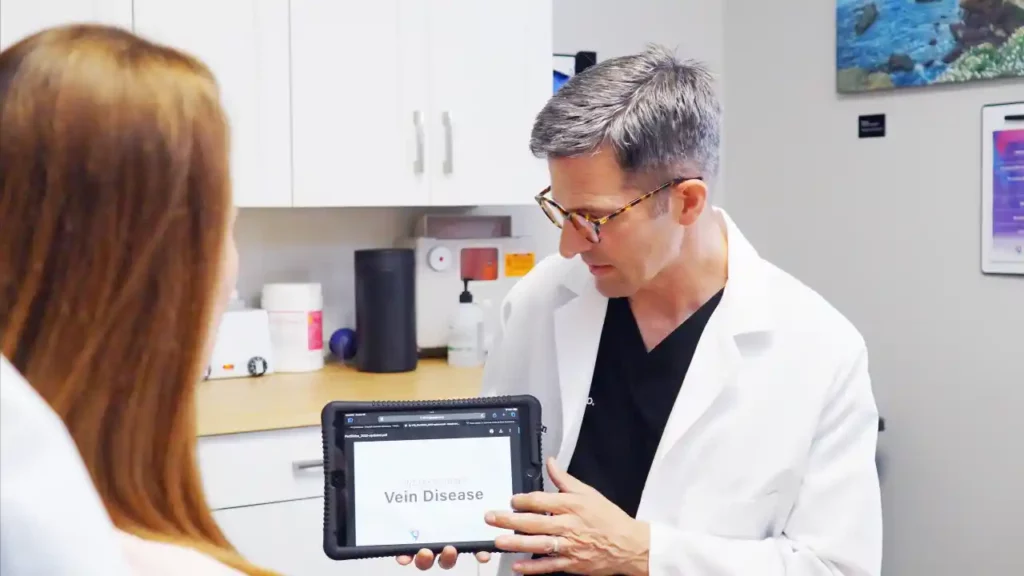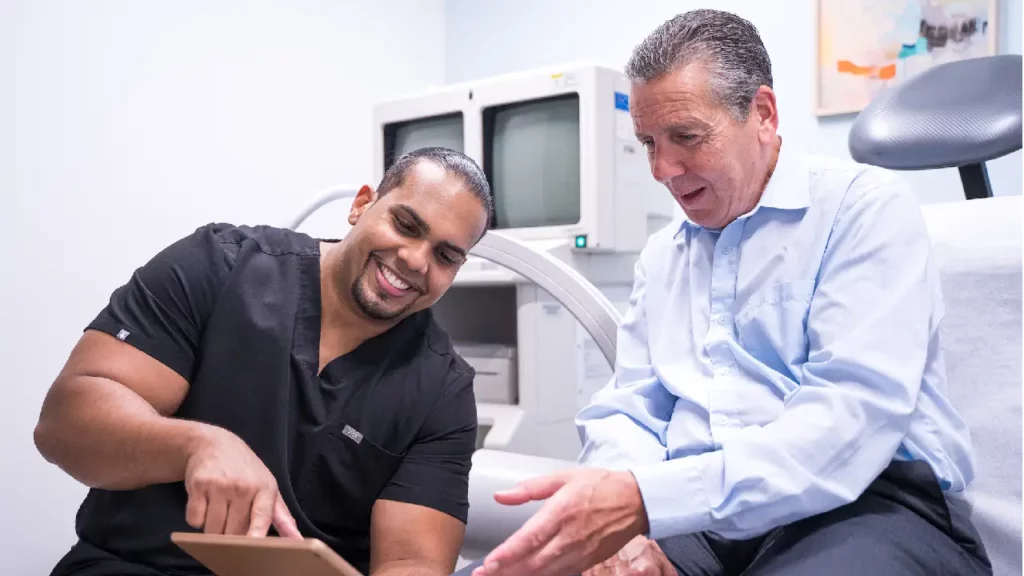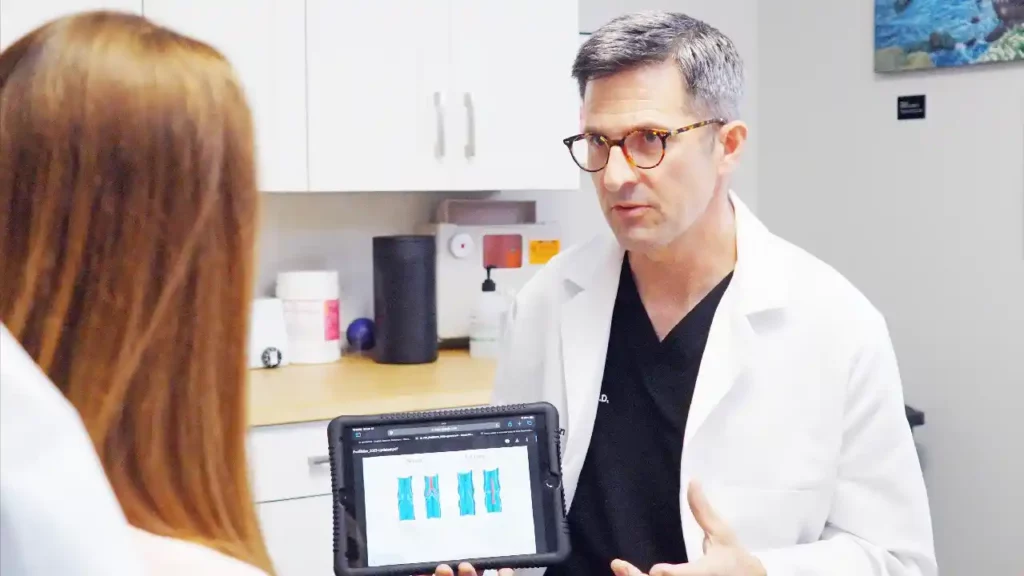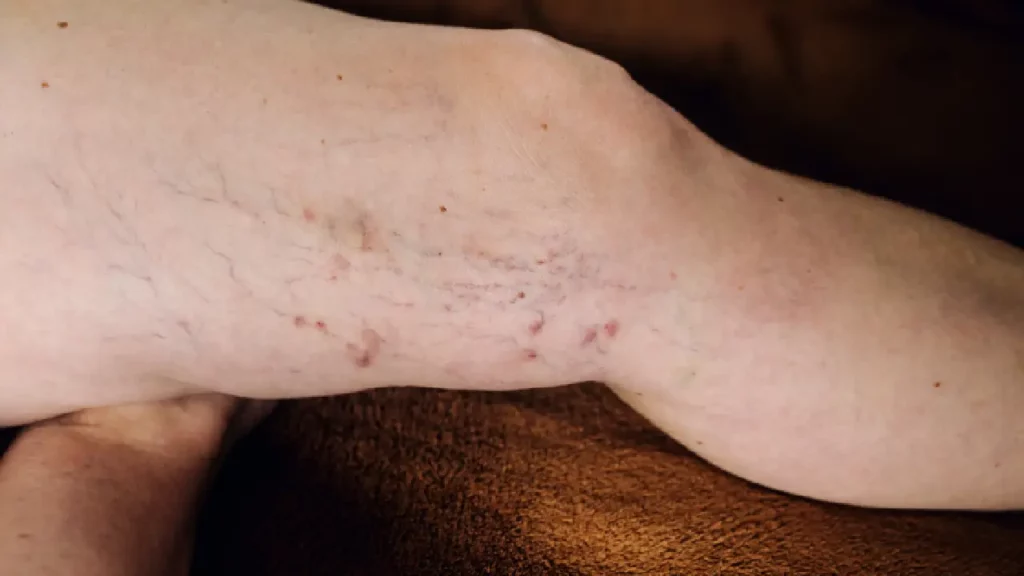Varicose veins are a common concern, especially among women. These enlarged, twisted veins can cause discomfort, pain, and cosmetic concerns. At Vein Doctor, we understand the importance of addressing both the symptoms and underlying causes of varicose veins. In recent years, it has become increasingly clear that obesity or excess weight can impact vein health and potentially increase the risk of varicose veins. Specifically, medications like Ozempic have been explored as weight-loss options that might also impact varicose veins.
In this article, we explore the details of Ozempic, its role in weight loss, and whether it can help reduce the risk of varicose veins.
What Are Varicose Veins?
Varicose veins occur when the valves in your veins, which help regulate blood flow, become weakened or damaged. This causes blood to pool in the veins, leading to their characteristic swollen and twisted appearance. Factors contributing to varicose veins include genetics, age, prolonged standing or sitting, hormonal changes, and obesity. Excess weight puts additional pressure on your veins, making it harder for blood to flow properly and increasing the likelihood of developing varicose veins.
The Role of Weight Management in Vein Health
Maintaining a healthy weight is crucial for overall health, including the health of your veins. Excess body weight, particularly in the abdominal area, increases pressure on the veins in your legs. This pressure can exacerbate venous insufficiency, where veins struggle to return blood to the heart, leading to varicose veins. Weight loss can reduce the strain on your veins, potentially alleviating symptoms and preventing the progression of varicose veins.
A balanced diet, regular exercise, and lifestyle changes are the cornerstones of effective weight management. However, for some individuals, achieving and maintaining a healthy weight can be challenging, necessitating additional interventions such as medication.
Introducing Ozempic for Weight Loss
Ozempic (semaglutide) is a medication originally developed to manage type 2 diabetes by helping control blood sugar levels. It belongs to a class of drugs known as GLP-1 receptor agonists, which mimic the action of a hormone called glucagon-like peptide-1. This hormone regulates blood sugar levels by stimulating insulin secretion and reducing glucagon release.
Beyond its role in diabetes management, Ozempic has shown promise as a weight-loss aid. Clinical trials have demonstrated that semaglutide can lead to significant weight loss in individuals with obesity or those who are overweight. Patients who take Ozempic report decreased hunger pangs and cravings, which can support long-term weight management and adherence to a healthy lifestyle and a low-calorie diet. This has led to its approval for weight management under the brand name Wegovy.
How Ozempic Promotes Weight Loss
Appetite Suppression
Ozempic helps reduce appetite by mimicking the action of the GLP-1 hormone, which is naturally produced in the gut. GLP-1 receptors are located in the brain, particularly in areas involved in appetite regulation. When these receptors are activated by Ozempic, they send signals that reduce hunger sensations. This means you are likely to feel less hungry and more satisfied with smaller portions of food, leading to a decrease in overall calorie intake.
Slowed Gastric Emptying
Another significant mechanism of Ozempic is its ability to slow down gastric emptying, which refers to the rate at which food leaves the stomach and enters the small intestine. By slowing gastric emptying, Ozempic helps you feel fuller for a longer period after eating. This prolonged satiety can reduce the frequency and size of meals, contributing to a lower caloric intake. The also helps in controlling snacking and reduces the likelihood of indulging in unhealthy foods.
Improved Blood Sugar Control
Ozempic was initially developed to help manage blood sugar levels in people with type 2 diabetes, and this function also supports weight loss. The medication enhances the secretion of insulin in response to meals, which helps regulate blood sugar levels. By preventing spikes in blood sugar after eating, Ozempic reduces the risk of rapid drops in blood sugar that can lead to intense hunger and cravings. Stable blood sugar levels contribute to consistent energy levels throughout the day, reducing the temptation to reach for quick, unhealthy snacks.
These combined effects of appetite suppression, slowed gastric emptying, and improved blood sugar control create a powerful tool for individuals seeking to lose weight. When integrated into a comprehensive weight management plan, Ozempic can help achieve sustainable weight loss.

Weight Loss and Varicose Veins: The Connection
Weight loss has been associated with improvements in venous function and a reduction in the symptoms of varicose veins. Shedding excess pounds decreases the pressure on your veins, enhances blood flow, and reduces the risk of blood pooling in the veins. This can lead to a decrease in the severity of varicose veins and may prevent their development in some cases.
While it is clear that weight loss benefits vein health, the specific impact of medications like Ozempic on varicose veins requires investigation. Current research focuses on Ozempic’s efficacy in weight management and diabetes, with limited data on its effects on vein health. Research is needed to explore whether the weight loss achieved with Ozempic directly correlates with improvements in venous function and a reduction in varicose veins.
Lifestyle Changes to Support Vein Health
While considering medications like Ozempic for weight loss, it’s important to complement them with healthy lifestyle choices. At Vein Doctor for Women, we advocate for a holistic approach to vein health that includes:
- Regular Exercise: Engage in activities that promote circulation, such as walking, swimming, and cycling. Exercise helps strengthen the muscles that support your veins and improves blood flow.
- Healthy Diet: Focus on a diet rich in fruits, vegetables, whole grains, lean proteins, and healthy fats. Avoid excessive salt, which can lead to water retention and increased pressure on your veins.
- Hydration: Drink plenty of water to maintain good circulation and prevent blood from thickening.
- Leg Elevation: Elevate your legs periodically throughout the day to reduce pressure on your veins and improve blood flow.
- Compression Stockings: Consider wearing compression stockings to support your veins and reduce swelling.
- Weight Management: Aim to achieve and maintain a healthy weight through a combination of diet, exercise, and, if necessary, medical interventions.
Our Approach at Vein Doctor for Women
At Vein Doctor for Women, we prioritize personalized care and holistic treatments tailored to your needs. Our board-certified vein doctors are dedicated to helping you achieve optimal vein health through medical treatments, lifestyle modifications, and ongoing support. In addition to addressing weight management, we offer a range of minimally invasive treatments for varicose veins, including:
- Sclerotherapy: A minimally invasive procedure that involves injecting a solution into the varicose veins, causing them to collapse and fade.
- Endovenous Laser Therapy (EVLT): A laser treatment that targets and seals off affected veins, thereby rerouting the accumulated blood into healthier leg veins.
- Radiofrequency Ablation (RFA): A procedure that uses radiofrequency energy to close varicose veins and the diseased vein responsible for your symptoms.
- VenaSeal: A medical adhesive that seals varicose veins or the saphenous vein responsible for venous insufficiency, redirecting blood flow to healthier veins.
We believe in empowering you with the knowledge and tools needed to manage your vein health effectively. Our team provides comprehensive consultations, discussing your symptoms, medical history, and lifestyle factors to develop a customized treatment plan. As part of our commitment to excellence, we stay abreast of the latest research and advancements in vein treatment. While the potential link between Ozempic and varicose vein risk reduction is still under investigation, we remain dedicated to offering evidence-based treatments and exploring new avenues for improving your vein health.
Consult Vein Doctor for Women to Improve Vein Health
Managing your weight is a crucial component of maintaining healthy veins and reducing the risk of varicose veins. Medications like Ozempic have shown promise in aiding weight loss, which may indirectly benefit vein health. However, further research is needed to establish a definitive connection between Ozempic and varicose vein risk reduction.
At Vein Doctor, we are committed to providing you with comprehensive care for optimal vein health. Whether through lifestyle modifications or minimally invasive spider vein and varicose vein treatments, we are here to help you achieve the best possible outcomes for your vein health. If you have any questions, please schedule a consultation today.






